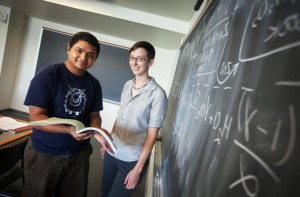Ask Rijan Maharjan ’14 why he chose to major in mechanical engineering, and he will tell you, quite simply, “I like to do stuff. Real stuff.”
Maharjan (Kathmandu, Nepal) is all about keeping it practical. This made him a good fit for his work this summer under the guidance of Julia Nicodemus, assistant professor of engineering studies.

Rijan Maharjan ’14 and Julia Nicodemus, assistant professor of engineering studies
Nicodemus’ research is about as practical as it gets: She’s investigating a method of using solar energy to produce fuel. It has the potential not only to be completely renewable, but to produce a minimal carbon footprint. As the world careens toward an energy crisis due to the shrinking availability of fossil fuels and struggles with increasing temperatures and severe weather due to climate change, alternative forms of energy like the one Nicodemus is pursuing are becoming increasingly important.
Nicodemus began working with solar fuels in 2007 while pursuing her Ph.D. in mechanical engineering at University of Minnesota. She is focusing on a process known as a two-step solar thermochemical cycle, which involves using concentrated sunlight to heat a metal oxide and split it into metal and oxygen. The resulting metal is then reacted with carbon dioxide and water, producing carbon monoxide and hydrogen, or synthesis gas, which can be used to make diesel fuel and other synthetic fuels.
The process also reproduces the metal oxide that began it, so that the net reaction in the cycle is the production of syngas from sunlight, water, and carbon dioxide. Thus, the two-step solar thermochemical cycle has the potential to be a renewable source of fuel. It is different from past uses of solar energy because, unlike technologies such as solar panels, its product can be stored indefinitely and transported anywhere.
Nicodemus’ challenge this summer, she says, was assessing the efficiency of the cycle and also calculating its costs. That’s where Maharjan came in.
“Rijan looked at the thermodynamic efficiency—if we put this much sunlight in, how much fuel can we get out?” says Nicodemus.
Maharjan spent his days producing models of the process on a computer program called MATLAB. He used the models to analyze the efficiency of each aspect of the cycle. Using that information, he performed economic analyses—how much will the cycle actually cost to implement?
“It’s not a really great idea if it costs a humongous amount of money,” he says. “So we’re trying to see how cost-effective we can make this.”
Maharjan also spent his time reading up on the latest articles from others in the energy field, meeting with Nicodemus to discuss his progress, and writing summaries of his work. Learning to write for an audience of energy experts, he says, has been one of most valuable aspects of his research. It is especially valuable in light of his desire to pursue mechanical engineering in graduate school, where he is considering a concentration in energy.
“I know now more than ever that grad school is something I’m interested in,” he says. “I know that I love this stuff enough to keep doing this.”
Maharjan’s work was funded through the EXCEL Scholars undergraduate research program. EXCEL students earn a stipend while working one-on-one or in small groups with faculty. Many projects result in conference presentations and publication in peer-reviewed journals.

3 Comments
Congratulations, Rijan brother!! I specially love your work, Rijan, because it’s something I too had been thinking of recently. Keep it up bro! This way we can make our country and world independent of fossil fuels. I am really glad that there is a way out for our country even if petroleum sources get exhausted in the near future. I am now following your concept. Let’s go green.
Congratulation Rijan..
And best wishes!!
Congratulations Rijan!!!! I’m so proud of you:)
Comments are closed.